 Petzlover
Petzlover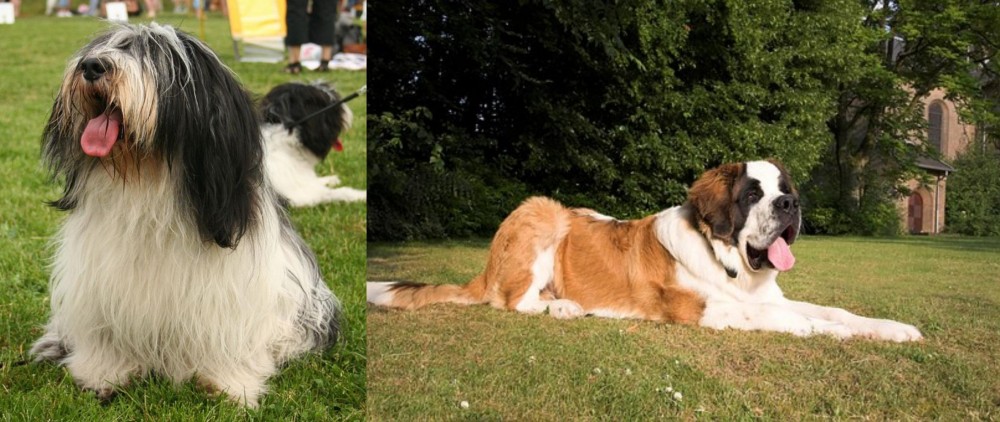 Polish Lowland Sheepdog is originated from Poland but St. Bernard is originated from Switzerland. Polish Lowland Sheepdog may grow 21 cm / 8 inches shorter than St. Bernard. Polish Lowland Sheepdog may weigh 67 kg / 147 pounds lesser than St. Bernard. Polish Lowland Sheepdog may live 5 years more than St. Bernard. Both Polish Lowland Sheepdog and St. Bernard has almost same litter size. Polish Lowland Sheepdog requires Moderate Maintenance. But St. Bernard requires High Maintenance
Polish Lowland Sheepdog is originated from Poland but St. Bernard is originated from Switzerland. Polish Lowland Sheepdog may grow 21 cm / 8 inches shorter than St. Bernard. Polish Lowland Sheepdog may weigh 67 kg / 147 pounds lesser than St. Bernard. Polish Lowland Sheepdog may live 5 years more than St. Bernard. Both Polish Lowland Sheepdog and St. Bernard has almost same litter size. Polish Lowland Sheepdog requires Moderate Maintenance. But St. Bernard requires High Maintenance
 Hailing from Poland, the Polish Lowland Sheepdog is believed to have descended from herding dogs as well as the Puli and Tibetan Terrier.
Hailing from Poland, the Polish Lowland Sheepdog is believed to have descended from herding dogs as well as the Puli and Tibetan Terrier.
Later these dogs were bred with local Scottish dogs to bring about Scottish herding dogs, the Bearded Collie. The dog was accepted by the Federation Cynologique Internationale in 1959. In 2001, the American Kennel Club recognized the Polish Lowland Sheepdog as a breed in the Herding Group.
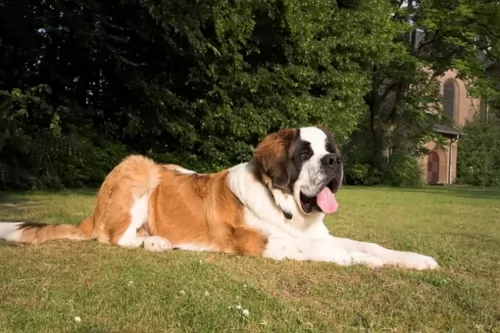 The St Bernard breed was once called the Alpine Cattle Dogs or the Alpine Mountain Dogs. They have always been farm dogs and mountain dogs in the French and Swiss Alps. They come from the border land of Switzerland and France. They were herding dogs, hunting, search and rescue, watchdogs and draft dogs.
The St Bernard breed was once called the Alpine Cattle Dogs or the Alpine Mountain Dogs. They have always been farm dogs and mountain dogs in the French and Swiss Alps. They come from the border land of Switzerland and France. They were herding dogs, hunting, search and rescue, watchdogs and draft dogs.
Their ancestors are considered to include the Sennenhunds and molosser breeds that came to the Alps with the ancient Romans. There are four Sennenhund breeds that are believed to have contributed to the original St. Bernard. These included the Greater Swiss Mountain Dog (Grosser Schweizer Sennenhund), the Appenzeller (Appenzeller Sennenhund), the Bernese Mountain Dog (Berner Sennenhund) and the Entlebucher Mountain Dog (Entlebucher Sennenhund) Today the St. Bernard is considered a Molossoid breed.
The first we know of the St. Bernard in any written records was in 1707 at the Great St. Bernard Pass and Great St. Bernard Hospice run by monks. There were found paintings of the dogs dating back into the late 1600’s. It is told that Barry saved upward of 100 people in the St. Bernard pass, and it is from these stories that the dogs gained their snow rescue reputation.
The St. Bernard of that time did not look like the St. Bernard does today as there was much crossbreeding. Many dogs dies during rescues in the avalanches of the mid 1800’s and so they Saint was crossed with the Newfoundland to preserve the breed. You can today see the resemblance in the build and looks of the two breeds. This cross brought about the long haired St. Bernard whose fur was too heavy for rescues.
The St. Bernards of mountain rescue fame were only about the size of a German Shepherd dog and were short haired. After crossing with the Newfoundland and moving into clubs and dogs shows, they have been bred to be much larger. Before the stud book was closed, it is thought that many larger breeds such as the Greater Swiss Mountain Dog, the English Mastiff, the Tibetan Mastiff, the Rottweiler, the Great Pyrenees, the English Bulldog, the Great Dane, the Bernese Mountain Dog, the Boxer and the Caucasian Oycharka all contributed to today’s St. Bernard.
In 1884 The Swiss St. Bernard Club was founded and the breed entered the Swiss Stud book as its first entry in 1884. It was 1888 when the standard was approved and the breed became the national dog of Switzerland. Before the name St. Bernard came to be common, these dogs might be called, Barry Dogs, Alepnmastiff, Noble Steeds or Saint Dogs.
The dogs came to England in the early 1800s and to the United States soon after. They were recognized by the European kennel clubs first and by the early 1900’s they were the most popular breed in the AKC.
 The Polish Lowland Sheepdog is a medium-sized dog. Both males and females stand between 42cm to 50 cm in height and they weigh roughly between 14 and 23kg.
The Polish Lowland Sheepdog is a medium-sized dog. Both males and females stand between 42cm to 50 cm in height and they weigh roughly between 14 and 23kg.
The dog has a double coat which can mostly be white, cream, gray, brown and black. The underdoat is soft and dense with the top coat being straight or wavy and being medium length.
There is quite a bit of hair around the facial area. The eyes are alert and brown and the ears medium size, high set and then drooping down. The tail has always been attractively docked, giving the dog an attractive, compact look but these days it is often just left long.
Lively, bright as a button, clever, social and feisty, the Polish Lowland Sheepdog is easy to train, becoming obedient and well balanced. The Polish Lowland Sheepdog is such a self confident dog and he will fit happily into life in the city or the countryside, loving spending time with his human family.
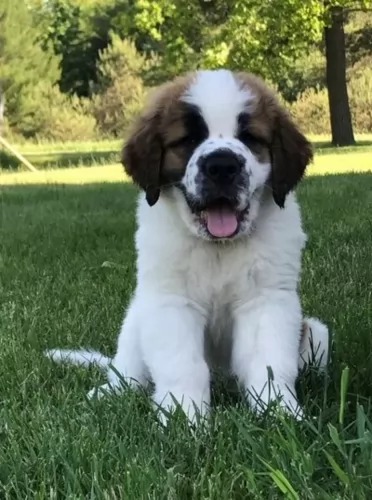 Today’s St. Bernard is not a large dog, he is a giant dog. Weighing in at 140-200 pounds and standing 28 to 35 inches tall, he is a lot of dog. Bred with mastiffs and large mountain dogs, they have proportional and powerful build. They are strong, sturdy and well muscled. They have either a smooth or rough (short or long) coat. Their eyes are brown or occasionally blue. They have tight lids, and square heads and muzzles.
Today’s St. Bernard is not a large dog, he is a giant dog. Weighing in at 140-200 pounds and standing 28 to 35 inches tall, he is a lot of dog. Bred with mastiffs and large mountain dogs, they have proportional and powerful build. They are strong, sturdy and well muscled. They have either a smooth or rough (short or long) coat. Their eyes are brown or occasionally blue. They have tight lids, and square heads and muzzles.
There are two coat types called smooth and rough, or short and long. The smooth shorter coat is tough, flat and close against the body and the long, rough coat is dense, wavy and heavy around the legs, neck and ruff. Both types have long tails that hang low and are heavy. Saints are known to slobber, drool and snore.
 The PON is an independent, self-willed dog but he can also be entertaining and amusing. He is a social, friendly dog but for many people, his long hair and grooming requirement might prove to be a bit of a handful.
The PON is an independent, self-willed dog but he can also be entertaining and amusing. He is a social, friendly dog but for many people, his long hair and grooming requirement might prove to be a bit of a handful.
Your dog is energetic, cheerful and playful and when he isn’t around, it will be like some sunshine has gone out of your life. He is faithful and loving towards his human family but is aloof towards strangers. Bring one of these dogs into your home and you’re guaranteed to have a remarkable friend and pet for many years.
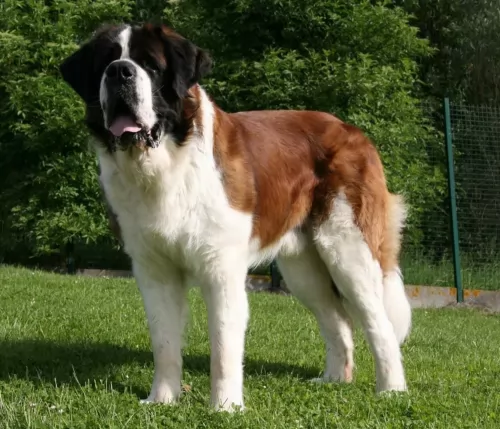 3.Adaptability no - these are giant dogs that need a lot of room. A large fenced yard or farm is best. They won’t do well in an apartment. They need exercise every day and loping around a yard is very good for them. They love to play in the snow, carry a backpack or pull a cart. They love to have a “job”
3.Adaptability no - these are giant dogs that need a lot of room. A large fenced yard or farm is best. They won’t do well in an apartment. They need exercise every day and loping around a yard is very good for them. They love to play in the snow, carry a backpack or pull a cart. They love to have a “job”
4.Learning ability – They are smart and highly trainable if motivated. They may appear lazy but they are just laid back and need a motivation.
 These dogs are generally healthy and the dog’s life expectancy is about 12 years. Nonetheless there are some problems to be aware of. For instance, with this dog, hip dysplasia is a real problem.
These dogs are generally healthy and the dog’s life expectancy is about 12 years. Nonetheless there are some problems to be aware of. For instance, with this dog, hip dysplasia is a real problem.
The Orthopedic Foundation of America evaluated the hip X-rays of hundreds of these dogs and found a large percentage were dysplastic.
Hereditary eye disease can also occur with this dog. Macular degeneration is a common eye disorder that can cause central vision loss. Many genetic abnormalities can cause degeneration of the image forming part of the eye. Unfortunately these conditions can result in total blindness. Parts of the retina can also degenerate with age.
Skin allergies are also an ever present threat with your dog. Itchiness and pain can be a nightmare for your pet and scratching and licking brings no relief – just aggravates the condition. You will certainly need to get your pet to the vet as skin allergies and skin diseases can make your beloved canine miserable.
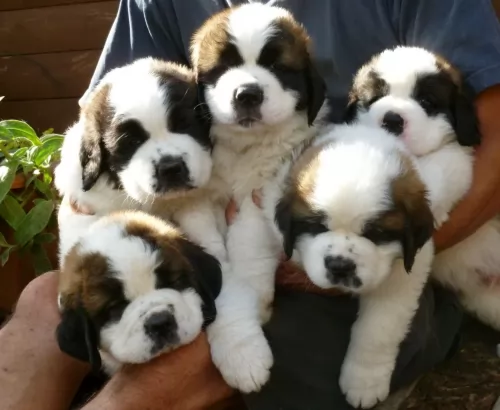 The first problem this breed faces is how fast they grow and gain weight. This can lead to serious health issues if not controlled. Their bones can be damaged by this excessively fast rate of growth. Other issues facing the breed include:
The first problem this breed faces is how fast they grow and gain weight. This can lead to serious health issues if not controlled. Their bones can be damaged by this excessively fast rate of growth. Other issues facing the breed include:
 Your Polish Lowland Sheepdog is like a big Bear and his long, shaggy coat will require regular brushing, otherwise it could become full of burrs and grass.
Your Polish Lowland Sheepdog is like a big Bear and his long, shaggy coat will require regular brushing, otherwise it could become full of burrs and grass.
Many people prefer to take their dogs to a grooming parlor where the hair is cut, the nails trimmed, the teeth cleaned and the ears checked.
Provide your Sheepdog with a nice warm, dry cozy spot that is his and where he can quietly retreat.
If your Polish Lowland Sheepdog spends time outdoors, make sure he has access to both shade, sun and shelter in case it rains. There must always be a bowl of fresh water outdoors too.
It is better to give your adult Polish Lowland Sheepdog 2 smaller helpings of food as opposed to one big bowl. Puppies will need 4 bowls of food a day. Two bowls will ensure your dog doesn’t gobble up his food and create digestive problems and bloat.
High-quality dry dog food will provide a balanced diet, but you want to make it a little more delicious for him occasionally by mixing in chopped up boiled chicken, brown rice, sweet potatoes, carrots and spinach. Just a tad of raw meat occasionally can also be of huge benefit.
Fresh, cool water should always be available around the clock. Be sure to keep his food and water dishes clean.
Have your dogs spayed or neutered if you don’t want them to have puppies.
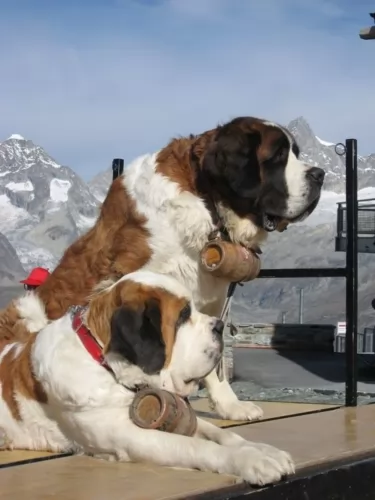 1.Feeding the puppy – You want to control their growth. Do not overfeed, and make sure they exercise but not too much. Feed a high quality large breed puppy food 3-4 X a day in small amounts.
1.Feeding the puppy – You want to control their growth. Do not overfeed, and make sure they exercise but not too much. Feed a high quality large breed puppy food 3-4 X a day in small amounts.
2.Feeding the adult – The problem you face with he adult St. Bernard is the potential for Bloat. Don’t over feed. Don’t feed before or after strenuous exercise. Feed 2-3 X a day in smaller amounts to prevent Bloat. Feed a high quality breed specific food if possible or an extra large breed formula.
4. Games and Exercises They need exercise but not as much as you might think. The St. Bernard is a laid back lumbering character so don’t over exercise her. They enjoy weight and cart pulling but they are not athletes who enjoy frisbee or agility. Search and rescue trials and tracking trials are perfect athletic endeavors for them.